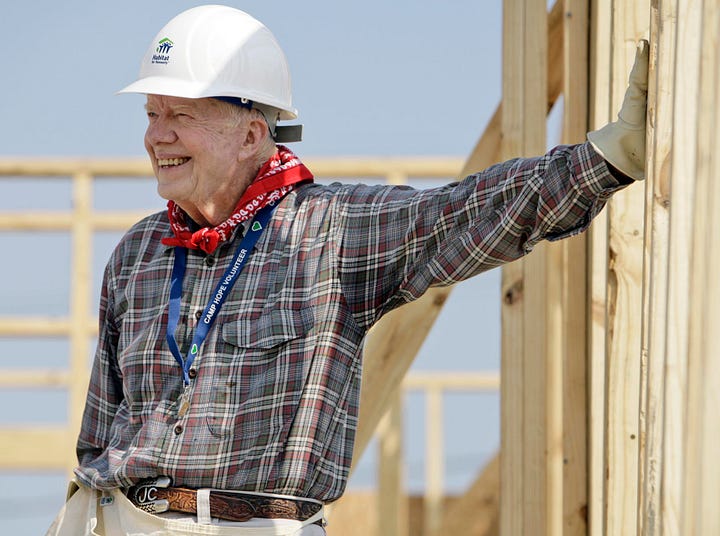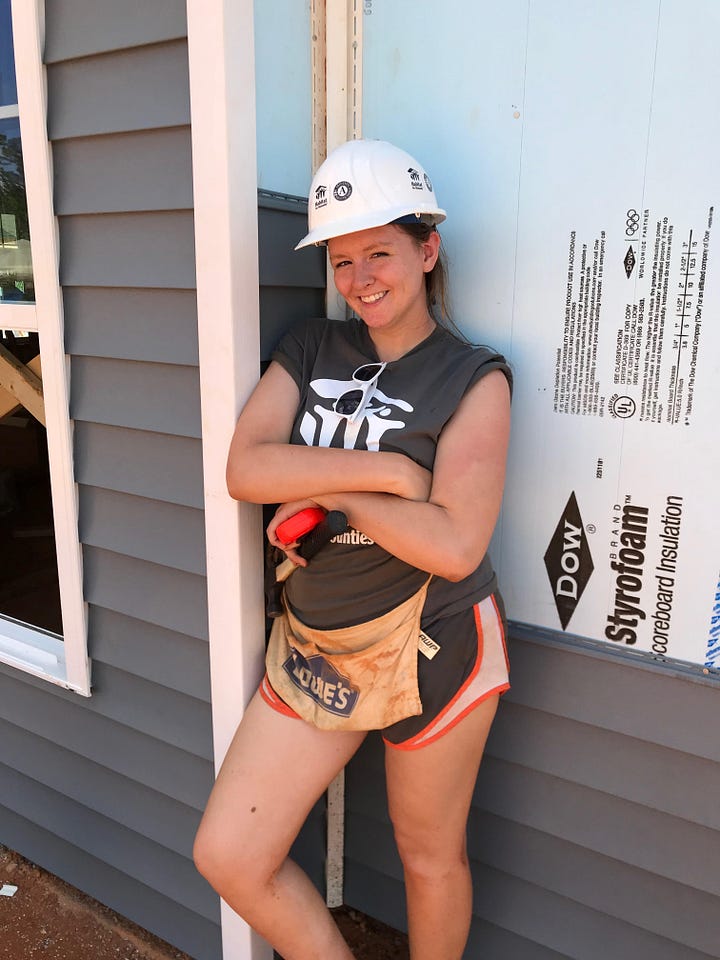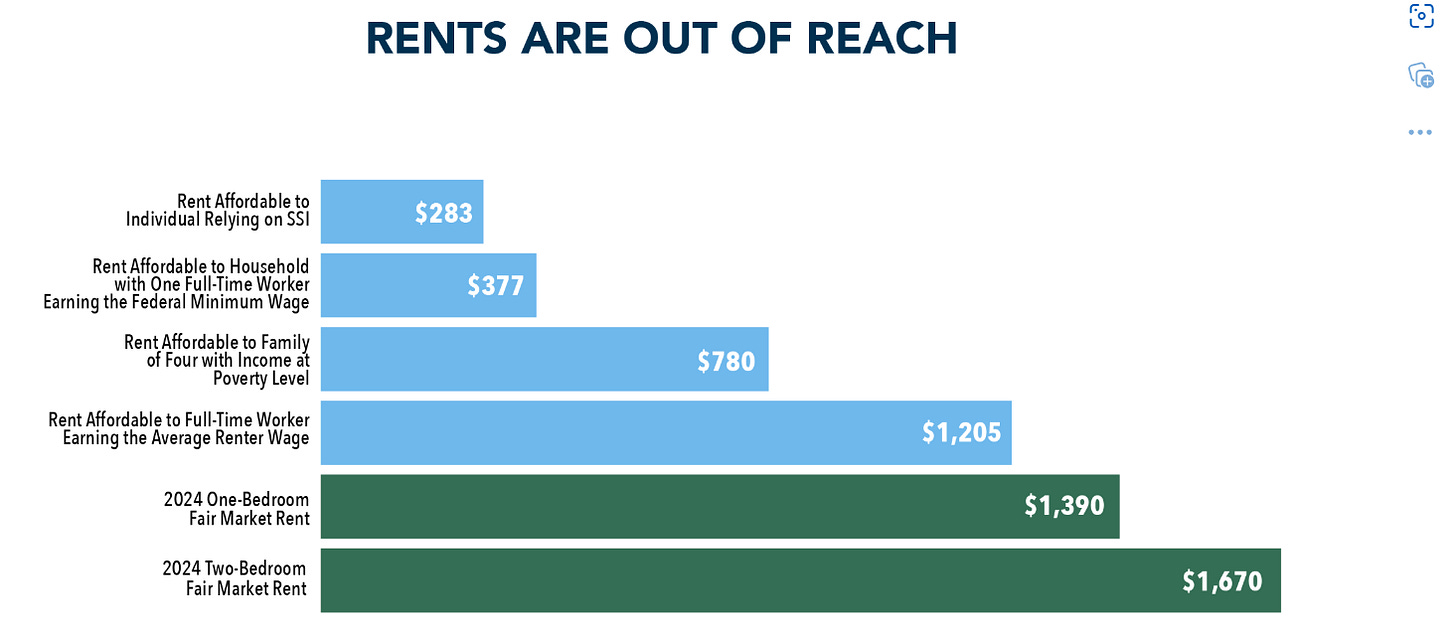I originally wrote this in summer 2020 to present as a speech for my local Toastmasters chapter over Zoom. At the time, I was an employee for a Habitat for Humanity chapter in Pennsylvania and witnessed first hand the housing crisis in America.
With the passing of Jimmy Carter (arguably the most famous Habitat for Humanity volunteer!) I felt compelled to update this and share it with a larger audience. Jimmy Carter was a lifelong advocate for the disadvantaged, and we were so lucky to have him for as long as we did.
Safe at Home - What If You Don't Have a Safe Home?
Introduction (from summer 2020):
As an employee for Habitat for Humanity the last three years, Paige has seen first hand the housing crisis that is crippling America. Then COVID-19 hit in March 2020. COVID-19 has unearthed problems bubbling beneath the surface all around the country. Paige is here to discuss how the pandemic has not only exacerbated the housing crisis, but brought it to light. The first step towards fixing a problem is to acknowledge it. Together, we can move forward and redefine what America's housing crisis looks like post-COVID.
Question: In how many states in America do you think someone working a full-time minimum wage job can afford a 2-bedroom apartment?
Think about it.
Make your guess.
And the correct answer is…
Zero.
According to the National Low Income Housing Coalition, a full-time worker earning the federal wage of $7.25 per hour cannot rent an affordable two-bedroom apartment anywhere in the country. Nowhere.
0 out of 50 states.
In 2024, a full-time worker needs to earn an hourly wage of $32.11 on average to afford a modest, two-bedroom rental home in the U.S. and $26.74 to afford a modest one-bedroom rental home. (!!!)
In my home state of Pennsylvania, one must make $26.26 an hour to afford a modest 2-bedroom rental home. If they’re working minimum wage, they would have to work 145 hours a week. Just think about that for a second.
The national average fair market rent for a one-bedroom home of $1,390 per month and $1,670 for a two-bedroom home is far from affordable for a family in poverty or a person relying on federal assistance.
America is facing a housing affordability crisis.
We’ve been facing this crisis for a long time now.
When the pandemic hit America in March of 2020, we collectively learned that we were not prepared for this pandemic in any way, shape, or form. We were told to shelter in place. We were told to be safe at home.
But what happens when you don’t have a safe home?
What happens when you’re living with extended family, all trying to work and do school virtually? What happens when there’s mold in your home? Or you lose your job, but the rent doesn’t stop?
As stated in my introduction, I worked for Habitat for Humanity of Bucks County, a nonprofit that helps families secure decent affordable housing. We define affordable housing as spending less than 30% of your paycheck on housing.
Unfortunately, in Bucks County, 1 in 4 households DO spend more than 30% of their paycheck on housing.
Over the pandemic, we were inundated with different findings of how COVID-19 was emphasizing and exacerbating the housing crisis in America.
The National Multifamily Housing Council found that in June 2020, 20% of households did not pay any rent by the first of the month—in September 2020, this grew to 23.6% households.
While updating this for SubStack, I learned that the National Multifamily Housing Council discontinued their rent tracking as of January 2022.
In April 2020, the Urban Institute reported that 28% of all adults reported feeling worried about being able to pay rent or mortgage. For those whose families had lost jobs or work hours, that number jumped to 45% - almost half - who worried about being able to pay rent or mortgage.
In May 2024, the Urban Institute reported that high rents are posing financial difficulties for renters of all incomes. 73% of renters said they save less than $500 a month—basically, one emergency can wipe them out.
Every time the first of the month arrives, I can guarantee you there are many families in Bucks County and nationwide who are having tough discussions about how they are going to be able to afford rent.
It’s no secret: The COVID-19 pandemic strained families’ abilities to afford basic needs. How can we improve for the future?
I don’t want to leave you overwhelmed and feeling hopeless about the world. I think we’ve all had enough of those feelings the last few years.
Instead I want to give you some ACTION STEPS. Things you can do after this post if you’re feeling inspired to learn more or get involved. 1) Educate 2) Advocate 3) Activate
1) Educate
We have the world at our fingertips. Our computers and our phones give us access to so much information. On the flip side, that can be overwhelming.
I have linked all the sources cited at the bottom of this post. Please take some time after reading to learn more. My favorite link is the interactive rent map of the US.
Additionally, there are lots of books, documentaries, and podcasts about our housing crisis. My husband and I recently listened to a Science Vs. podcast titled: Who Killed Affordable Housing? Incredibly insightful, and only 30 minutes.
The Color of Law: A Forgotten History of How Our Government Segregated America by Richard Rothstein is an excellent book that delves into the racial history of housing in America. “Segregated by Design,” narrated by Rothstein, is a powerful 17 minute video that highlights many of the points in the book:
2) Advocate
Five years ago, Habitat set out to accelerate action on home affordability through the Cost of Home campaign, which ran from 2019-2024. Through this campaign, local and state Habitat for Humanity organizations, partners, volunteers, and community members across the United States worked together so that 9.5+ million people could have access to an affordable home.
Habitat for Humanity is committed to mobilizing our partners and communities to find solutions and help create policies that will increase access to affordable housing. Throughout the five years, there were many wins:
Habitat of Orange County helped residents advocate for improved living conditions & stabilized rent during the economic downturn.
Habitat Iowa successfully advocated for eviction and foreclosure prevention measures.
What can your local chapter do?
3) Activate!
Equipped with education and a desire to help others, perhaps now is the time to get involved in your community! There is more work to be done.
One way, of course, is to channel Jimmy Carter and volunteer with your local Habitat for Humanity! Through the organization, you can build houses, become a financial coach, or volunteer at a ReStore.
You can also reach out to your representatives and make your voice heard, or get out in the community and personally talk with people who are facing these very real housing problems.


Thank you so much for taking the time to read this today. I hope you learned a thing or two. Together through education, advocacy, and community activism, we can move forward and redefine what America's housing crisis looks like.
I’ll always remember doing tabling events for Habitat for Humanity during my four and a half years working for the organization, and people passing by with wide grins on their faces saying, “Hey! Jimmy Carter!” He certainly helped put Habitat for Humanity on the map, and I hope we can honor his legacy by continuing the work he did.
Sources:
Video from Habitat for Humanity Americorps 2018 Build-A-Thon in Wake County, North Carolina
Interactive map for minimum wage and two-bedroom apartments: https://reports.nlihc.org/oor
Rent Payment Tracker: https://www.nmhc.org/research-insight/nmhc-rent-payment-tracker/
“The Color of Law” by Richard Rothstein
Habitat findings: https://www.habitat.org/stories/7-findings-covid-19s-impact-housing?fbclid=IwAR0R7YP8OXK9S4VEIskRJuwDgDdzI8w1VW_EHV-HZK521p1g9ESwje4RvpY
Cost of Home Habitat International: https://www.habitat.org/costofhome
Cost of Home Habitat Bucks: https://www.habitatbucks.org/advocate/
Habitat Advocacy Successes: https://www.habitat.org/costofhome/advocacy-successes
Urban Institute: https://www.urban.org/urban-wire/high-rents-are-posing-financial-challenges-renters-all-income-levels
National Low Income Housing Coalition: https://nlihc.org/oor/about#:~:text=In%20no%20state%2C%20metropolitan%20area,home%20at%20fair%20market%20rent.








What a great, informative article! Thank you for sharing your knowledge with us. 🙏